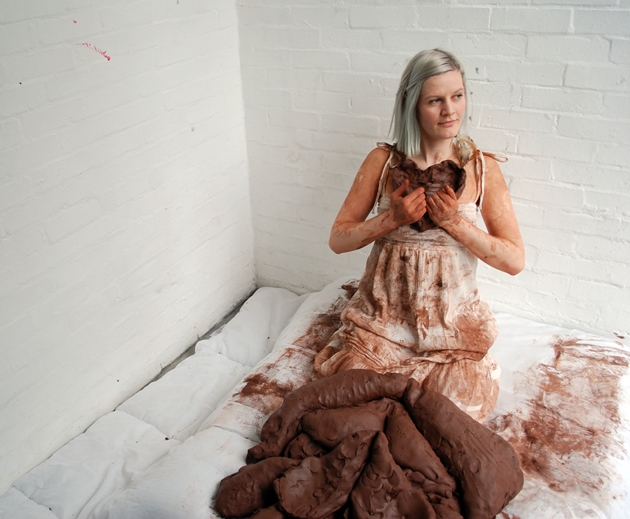With the background in the story of Faust

The origin of the work 'Who looks outside, dreams; who looks inside, awakes' I'm going to show in Camden Arts Centre, London, 2012, derives from an enactment of a scene in Goethe's Faust. Though the work has moved on from where it started with an interpretation of emotions into clay.
The emotions by which the girl Gretchen - despite Faust being responsible for her death - forgives him so he can go to heaven and thereby saves his soul from the devil.
The emotions by which the girl Gretchen - despite Faust being responsible for her death - forgives him so he can go to heaven and thereby saves his soul from the devil.
For those of you who aren't totally familiar with Goethe's Faust, the short story is: Faust is a learned scholar that feels that none of his many achievements has provided him with the satisfaction of fulfillment. In his yearning to gain knowledge of the meaning of existence Faust makes a pact with Mephistopheles the devil. He agrees to serve Mephistopheles in hell if he can give him one moment of experience which is so rewarding that he calls upon that moment to stay as it is forever. Faust attempts to find happiness through emotional involvement. He seduces the innocent and young Gretchen and destroys her destiny in their tragic love affair that ends with Faust being responsible for her death. Later he tries to satisfy his craving through temporal accomplishments and exposure to all that the world can offer, but none of these things gives him lasting peace of mind.
After a long and complicated course of events Faust do experience a moment of sheer bliss and Mephistopheles believes Faust has lost his wager and tries to claim his soul. Angels appear and catches Faust's soul before Mephistopheles will bring it to hell. Gretchen appears in the form of the Eternal Feminine, despite Faust caused her death she offers to lead Faust into heaven and saves him with her pleading for God's grace. This grace is truly gratuitous and does not condone Faust's former sins. This grace is only occurring because of Gretchen's forgiveness and his unending striving after goodness and resolution to believe in the existence of something higher than himself.
See all the images here
See all the images here
My works are often based on layers and layers of meaning, thoughts and references.
That being the rule, it is important not to over complicate things. These layers are a platform and then I try to forget it all again to get the instinctive and present energy that makes it come to live.
Some of my thoughts from this session was (in list and bullet form): 'Inside out' : Reversed portrait, or imprints of the outside space of the body : Symbolic marking of the heart : Building the thing, from my body, lay it in a symmetrical pattern inspired from bilateral symmetry of our body : Symbolic making of the heart and to give it to the clay creature : Go through the hazard of making and then turn your back on it and leaving it/let it go : giving, but not claiming ownership or wanting anything in return.
Faust: The setting in this session is chosen to give a 'blank canvas' to work on. The objects making up the final formation/sculpture/installation are all sculpted on my body.
- White walls and duvet: contradiction: Soft and caring atmosphere. The cold institution walls are counterbalanced by the soft floor. In the centre of the room is something that could be a bed or a stage.
- The white dress: the eternal feminine, the sacrifices (or willing-ness to give) is visible by the symbolic sacrifices/ruin of the clean and crisp surface. It is easy to trace that something has been going on. Classical antique reference.
- The red clay: symbolises emotions, flesh, things can rip our chest open, but also for instance emotions like forgiveness is powerful. There is also a reference to some level of general spirituality: reference to the origin of man, woman. Nature people, Indians, Vikings, before civilisation.
Desire: "is a machine, and the object of desire is another machine connected to it.” “Making love is not just becoming as one, or even two, but becoming as a hundred thousand…we always make love with worlds”. (Deleuze) & Eros: as a power of creation, will, life-energy, love, desire. (Marcuse, Herbert: Eros and Civilization).


No comments:
Post a Comment